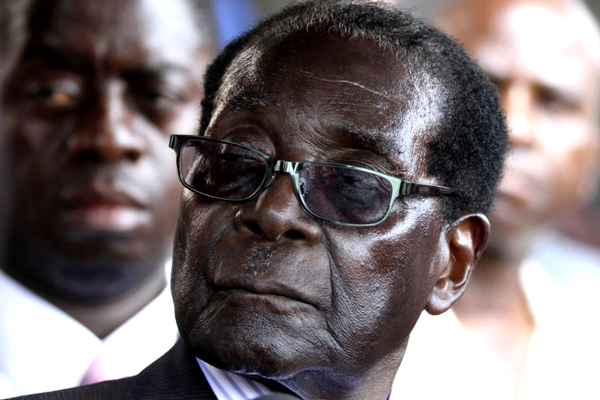
PRESIDENT Robert Mugabe reportedly offered to step down as early as 2002, but the ruling Zanu PF proposed that he should stay on in a ceremonial position, with Vice-President Emmerson Mnangagwa assuming the role of Prime Minister, former Education minister David Coltart has claimed.
BY RICHARD CHIDZA
In his autobiography titled The Struggle Continues: 50 Years of Tyranny, Coltart claims a series of talks ensued in the aftermath of the disputed 2002 presidential elections at the instigation of South Africa’s ruling African National Congress (ANC) party.
“While I was in North America, a Catholic priest, Father Fidelis Mukonori, a confidant of Mugabe, had called on (MDC-T leader Morgan) Tsvangirai to tell him Mugabe wanted to meet outside the country,” Coltart wrote.
“This was followed by an approach to Tsvangirai by Colonel Lionel Dyck, who had gained the confidence of Zanu PF when he successfully led an army brigade against dissidents during the Gukurahundi in Matabeleland.”
Tsvangirai, according to a February 2003 story by respected South African journalist Allister Sparks, had insisted on the “restoration of legitimacy”, which meant fresh elections, but this had been opposed by Mnangagwa, who reportedly claimed Zanu PF needed time to “sort out its leadership”.
Coltart — in the book that has caused ructions over his version of events regarding the emotive Gukurahundi massacres committed by the army in the 1980s — said Dyck had told Tsvangirai that former Commander of the Defence Forces General Vitalis Zvinavashe and Mnangagwa had indicated they were concerned about “the worsening situation in Zimbabwe”.
“According to Tsvangirai, Dyck told him that Mugabe had agreed to retire, but said nothing about holding elections,” the former Senator wrote.
- Chamisa under fire over US$120K donation
- Mavhunga puts DeMbare into Chibuku quarterfinals
- Pension funds bet on Cabora Bassa oilfields
- Councils defy govt fire tender directive
Keep Reading
“It was in this context that on December 5, I received a telephone call from a prominent South African businessman, who had close links to the ANC, asking me to fly to Johannesburg urgently to meet an ANC emissary.
“I flew down and, on Sunday, December 8, I met with the man, who introduced himself to me as Patrick Moseke.”
Moseke, according to Coltart, had already met Mnangagwa and his delegation for talks prodded by former South African President Thabo Mbeki.
Coltart said he was asked to provide the MDC’s position.
“I said there would have to be some form of transitional authority, which would be of limited duration and which would have a limited mandate restricted to governing the country during the transitional period, securing food and medicines to avert famine, stabilising relations with the international community and agreeing on and passing new laws dealing with the electoral environment,” he wrote.
“This would have to culminate in a fresh election for President.”
After presenting the MDC’s position to Mnangagwa, Coltart wrote, Moseke said Zanu PF were not keen on fresh elections, but were willing to compromise.
“Zanu PF did not want another election and they wanted Mugabe to remain on as ceremonial President, with Mnangagwa taking on the role of Prime Minister. According to Moseke, Mnangagwa would adopt a more pragmatic approach to a range of issues, including that of commercial farmers,” he wrote.
“The MDC would be offered several Cabinet positions and there would be a lessening of political tensions. Mnangagwa was presented on stage at the ANC’s national conference in Stellenbosch, where he was given a standing ovation.”
And when news broke of the secret talks in mid-January 2003, everything fell through, as Mnangagwa, Mbeki and Zvinavashe all denied the claims.
But according to Coltart, “there was also a sting in the tail”.
“If we (MDC) did not accept their entreaties, Mnangagwa would crush the opposition more completely than Mugabe had sought to do,” he said.
Coltart said he had also been shown a document analysing the situation in Zimbabwe prepared by the ANC and the South African intelligence that Mbeki had accepted, which described the then-united MDC as a “rudderless party, lacking both policies and unity”.
However, Zimbabwe’s then ambassador to South Africa and now Zanu PF spokesperson, Simon Khaya Moyo, claimed yesterday he had no idea of the talks.
“I do not know that. I really have no idea,” he said when contacted for comment. “Why would they meet in South Africa? Were there no hotels in Zimbabwe? I do not know about that.”
Tsvangirai’s spokesperson Luke Tamborinyoka said he was still to read Coltart’s book.
“We are yet to read the book and only then can we be able to provide a comprehensive comment,” he said. The Tsvangirai-led MDC secretary-general at the time, Welshman Ncube, confirmed existence of the talks. “I can confirm that indeed Coltart travelled to South Africa to meet the people he said he met,” he said. “I can confirm that Tsvangirai was approached by Fr Mukonori purportedly as an emissary of Mugabe and that a generally vague proposal was put to the MDC for some sort of government of national unity with Zanu PF, but was rejected by the national executive.”
Ncube said he, however, could not vouch for Coltart’s version of what was said about Mugabe’s alleged offer to retire or Mnangagwa’s proposed role.
Repeated efforts to get a comment from ANC spokesperson Zizi Kodwa proved fruitless yesterday as his mobile phone went unanswered.
As if to confirm Mnangagwa’s contact with Dyck, a United States diplomatic cable leaked by whistleblower website Wikileaks, dated March 24, 2006, claimed then-independent Tsholotsho North legislator Jonathan Moyo said the former Rhodesian soldier had compromised the Vice-President’s chances of succeeding Mugabe.
“Moyo said he was increasingly doubtful about Mnangagwa’s prospects,” the cable read.
“Mnangagwa’s association with the Tsholotsho affair, the Col Dyck affair, the 1980s Gukurahundi massacres in Matabeleland and ruling party financial skulduggery all gave Mugabe or (axed Vice-President Joice) Mujuru tools with which to undermine Mnangagwa privately and publicly.”











